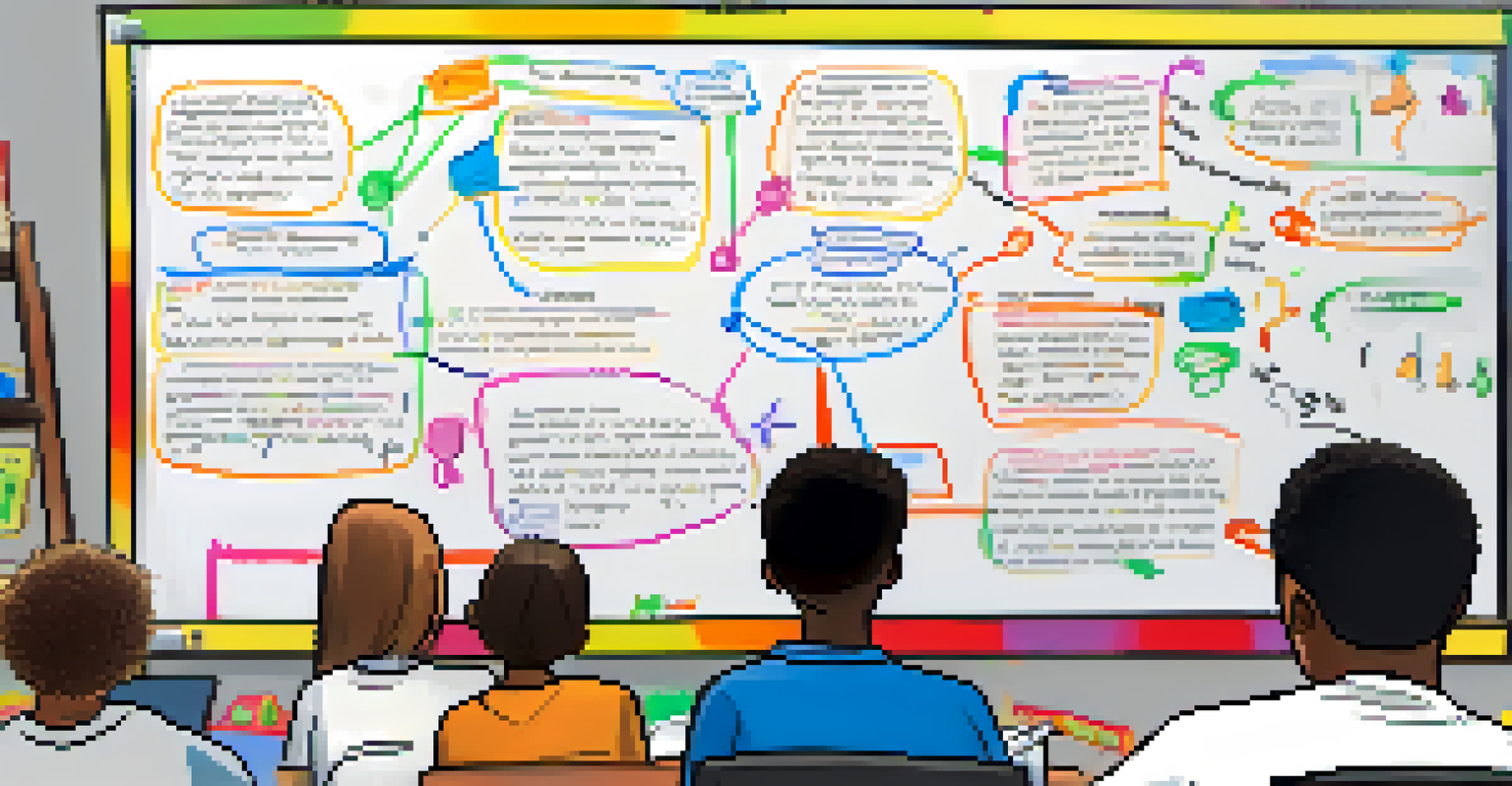Using Inquiry-Based Learning to Develop Problem-Solving Skills

What is Inquiry-Based Learning and Its Importance?
Inquiry-Based Learning (IBL) is an educational approach that encourages students to ask questions, investigate, and discover answers on their own. This method shifts the focus from traditional rote learning to a more engaging, hands-on experience. By allowing students to explore topics of interest, IBL fosters a deeper understanding and retention of information.
Education is not the filling of a pail, but the lighting of a fire.
The importance of IBL lies in its ability to cultivate critical thinking skills. Students learn to analyze situations, evaluate evidence, and draw conclusions, which are essential components of effective problem-solving. This approach not only prepares them for academic success but also equips them with skills applicable in real-world scenarios.
Furthermore, IBL nurtures a sense of curiosity and a love for learning. When students are encouraged to pursue their inquiries, they become more invested in their education. This intrinsic motivation can lead to a lifelong passion for problem-solving and innovation.
The Role of Questions in Inquiry-Based Learning
Questions lie at the heart of Inquiry-Based Learning. They serve as the driving force that leads students to explore, investigate, and learn. A well-crafted question can ignite curiosity and encourage students to delve deeper into a subject matter.

For example, instead of asking 'What is photosynthesis?', a more engaging question might be 'How do plants survive in different environments using photosynthesis?'. This not only prompts students to research photosynthesis but also to consider environmental factors, enhancing their problem-solving skills through contextual learning.
Inquiry-Based Learning Enhances Skills
Inquiry-Based Learning fosters critical thinking and problem-solving skills through student-led exploration and discovery.
Encouraging students to formulate their own questions is equally important. This practice empowers them to take ownership of their learning, fostering independence and critical thinking. As students seek answers to their questions, they naturally develop problem-solving strategies that can be applied beyond the classroom.
How to Implement Inquiry-Based Learning in the Classroom
Implementing Inquiry-Based Learning starts with creating a supportive environment where students feel safe to ask questions and express their thoughts. Teachers can facilitate this by modeling inquiry behaviors and encouraging open discussions. Establishing a culture of curiosity helps students develop the confidence to explore.
The beautiful thing about learning is that no one can take it away from you.
Next, teachers should design lessons around compelling questions or problems. This could involve case studies, experiments, or real-world challenges that require students to investigate and collaborate. By working together, students can share diverse perspectives and strategies, enriching their problem-solving processes.
Lastly, assessment in an IBL framework should focus on the learning process rather than just the final product. Reflective practices, peer evaluations, and self-assessments can provide valuable insights into students' problem-solving journeys, helping them understand their strengths and areas for improvement.
The Benefits of Collaboration in Inquiry-Based Learning
Collaboration is a key element of Inquiry-Based Learning. When students work together, they bring different viewpoints and skills to the table, enhancing the overall learning experience. This collaborative effort fosters communication and teamwork, essential skills in today’s problem-solving landscape.
For instance, group projects can challenge students to tackle complex problems collectively. By dividing tasks and sharing responsibilities, they learn to leverage each other's strengths while developing their problem-solving strategies. This prepares them for future collaborative environments, whether in higher education or the workforce.
Collaboration Boosts Learning Experience
Working together in groups enhances student understanding and communication, preparing them for future collaborative environments.
Moreover, collaboration encourages peer-to-peer learning. Students can explain concepts to one another, solidifying their understanding while helping others. This reciprocal teaching model not only reinforces their knowledge but also builds a supportive learning community.
Real-World Applications of Inquiry-Based Learning
Inquiry-Based Learning is not limited to the classroom; its principles can be applied to real-world situations. By encouraging students to investigate real-life problems, they learn to apply their knowledge and skills in practical contexts. This relevance helps bridge the gap between theory and practice.
For example, students might investigate local environmental issues, analyzing data and proposing solutions. This hands-on experience not only enhances their problem-solving skills but also instills a sense of civic responsibility and engagement. They learn that their inquiries can lead to meaningful change.
Additionally, professionals in various fields often use inquiry-based approaches to solve complex problems. By equipping students with these skills, educators prepare them for successful careers where critical thinking and problem-solving are crucial.
Challenges in Implementing Inquiry-Based Learning
While Inquiry-Based Learning offers numerous benefits, it also comes with its challenges. One significant hurdle is the need for teachers to shift their mindset from traditional teaching methods to a more facilitative role. This transition can be daunting, especially for those accustomed to direct instruction.
Another challenge is the variability in student engagement. Not all students may feel comfortable or motivated to take the lead in their learning. Teachers must find ways to inspire and support these students, ensuring that everyone participates in the inquiry process.
Real-World Relevance of IBL
Inquiry-Based Learning connects academic knowledge to real-life situations, empowering students to address practical problems and engage with their communities.
Lastly, assessment can be tricky in an IBL framework. Educators need to develop new strategies to evaluate students' understanding and skills effectively. Balancing formative assessments with traditional grading practices requires careful planning and creativity.
The Future of Inquiry-Based Learning in Education
As education evolves, the role of Inquiry-Based Learning is expected to grow. With the increasing emphasis on critical thinking and problem-solving in both academic and professional settings, IBL aligns perfectly with these demands. It prepares students not just to absorb information but to actively engage with it.
Moreover, advancements in technology offer exciting opportunities for enhancing IBL. Online resources, interactive platforms, and collaborative tools can facilitate inquiry-driven projects, allowing students to connect with experts and peers worldwide. This global perspective enriches their learning experience.

Ultimately, the future of education lies in fostering inquisitive minds capable of navigating complex problems. By embracing Inquiry-Based Learning, educators can cultivate the next generation of thinkers, innovators, and problem solvers who are ready to tackle the challenges of tomorrow.